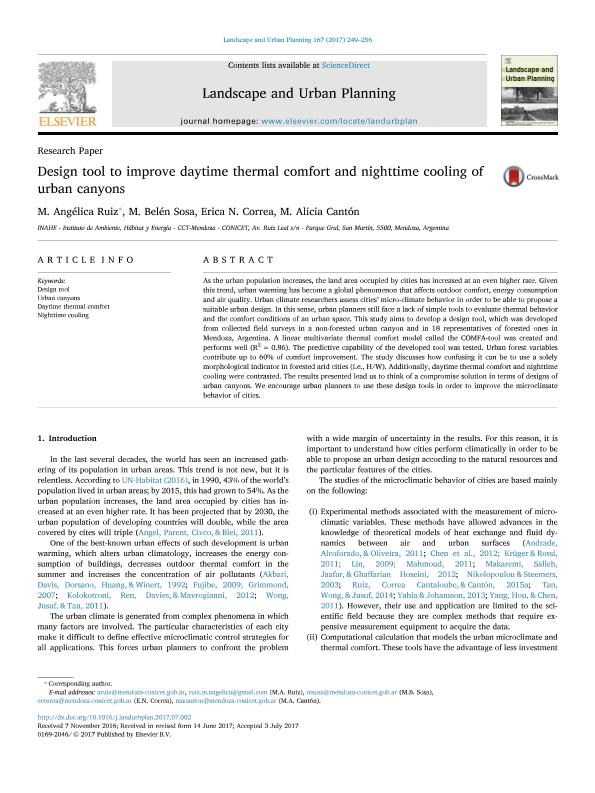Artículo
Design tool to improve daytime thermal comfort and nighttime cooling of urban canyons
Fecha de publicación:
11/2017
Editorial:
Elsevier Science
Revista:
Landscape And Urban Planning
ISSN:
0169-2046
Idioma:
Inglés
Tipo de recurso:
Artículo publicado
Clasificación temática:
Resumen
As the urban population increases, the land area occupied by cities has increased at an even higher rate. Given this trend, urban warming has become a global phenomenon that affects outdoor comfort, energy consumption and air quality. Urban climate researchers assess cities’ micro-climate behavior in order to be able to propose a suitable urban design. In this sense, urban planners still face a lack of simple tools to evaluate thermal behavior and the comfort conditions of an urban space. This study aims to develop a design tool, which was developed from collected field surveys in a non-forested urban canyon and in 18 representatives of forested ones in Mendoza, Argentina. A linear multivariate thermal comfort model called the COMFA-tool was created and performs well (R2 = 0.86). The predictive capability of the developed tool was tested. Urban forest variables contribute up to 60% of comfort improvement. The study discusses how confusing it can be to use a solely morphological indicator in forested arid cities (i.e., H/W). Additionally, daytime thermal comfort and nighttime cooling were contrasted. The results presented lead us to think of a compromise solution in terms of designs of urban canyons. We encourage urban planners to use these design tools in order to improve the microclimate behavior of cities.
Palabras clave:
Daytime Thermal Comfort
,
Design Tool
,
Nighttime Cooling
,
Urban Canyons
Archivos asociados
Licencia
Identificadores
Colecciones
Articulos(INAHE)
Articulos de INSTITUTO DE AMBIENTE, HABITAT Y ENERGIA
Articulos de INSTITUTO DE AMBIENTE, HABITAT Y ENERGIA
Citación
Ruiz, María Angélica; Sosa, María Belén; Correa Cantaloube, Erica Norma; Canton, Maria Alicia; Design tool to improve daytime thermal comfort and nighttime cooling of urban canyons; Elsevier Science; Landscape And Urban Planning; 167; 11-2017; 249-256
Compartir
Altmétricas




